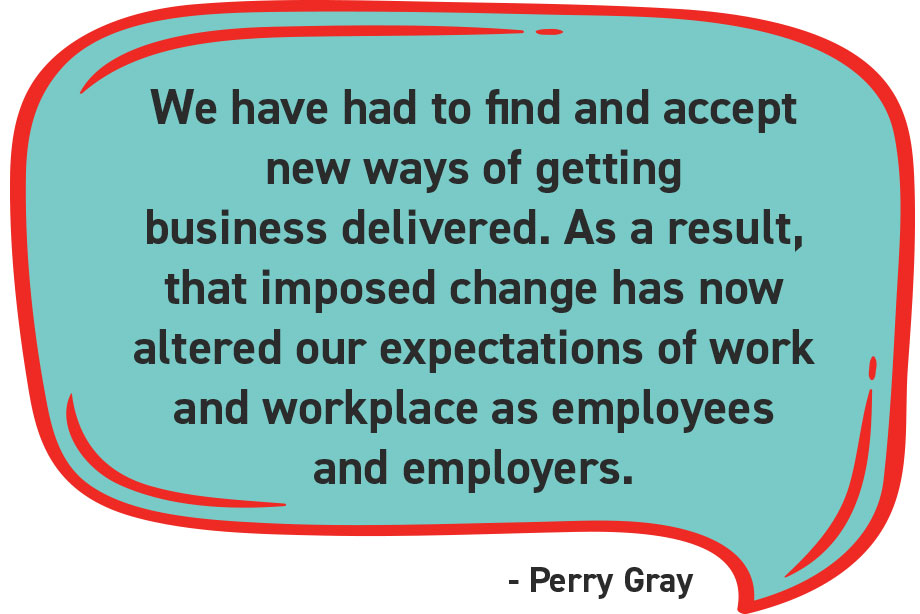The Post-Covid Workplace Conundrum
by Perry Gray
The Covid experience has forced us to change and adapt, like it or not. That has happened on a personal level and a business level.
We have had to find and accept new ways of getting business delivered. As a result, that imposed change has now altered our expectations of work and workplace as employees and employers.
The old ways are gone, and we have settled into our new ways. New “flexible” ways.
Working from home has had many positives, including proving presenteeism was not an effective way to manage a team. Trust is now the priority, as it should have been from the beginning.
I would contend that a “slack” disengaged employee, is a slack disengaged employee whether at home or in the office. It is the alignment and attitude and not the location, that needs to be addressed.
It is only when the metrics of productivity and value are established, that flexible and hybrid working will be successful. Firstly, we all must understand how we can contribute to the bigger picture and create real value, and then we can utilise the new digital tools and empowerment to achieve that from anywhere.
The Covid isolation, has been corrosive to an organisations culture. Collaborative endeavours have been slowed and frustrated by the separation. However, on the flip-side, the lack of commute times and the ability to carry out deep work at home, without the distractions of an open plan office, has afforded some higher quality outcomes and improved lifestyles.
As with most things in life, the successful workplace equation is neither clear cut nor binary. There are many grey areas when it comes to judging the effectiveness or success of flexible working. Some tasks are better resolved at home in a quiet space and some tasks are better achieved in a group setting, where we can doodle on whiteboards together, read the body language and not be frustrated by sketchy on-line connections.
We can all agree however, that when it comes to building meaningful connections and long-term relationships, only face-to-face interaction cuts it.
The answer is and always was, build a team based upon shared values and purpose, agree on the metrics of their deliverables, give them the tools and environment to enable the outcomes, empower them to make the decision on where they work and with whom they work, in order to best get the job done. Then trust them to make good decisions. Management’s role is to remove the roadblocks, reward the right behaviours and get out of the way.
A critical part of “coming back” from the Covid experience, will be having a fully aligned team, supported by a healthy and resilient culture. Part of the rebuilding or strengthening of that resilience, will necessitate an increase in the face-to-face time to reconnect and return to higher levels of innovation and productivity.
This will require the creation of an attractive space that uniquely reflects the brand and cultural values of the organisation. That space must provide the digital and physical tools to enable and encourage the desired behaviours, interactions, and outcomes. It must be supported by the corporate culture that is simpatico.
Post-Covid, there are many “office” spaces available, be they an organisation’s current space or new spaces to relocate to. Whatever the decision, the future space will need to be right-sized and fit-for-purpose. The space must have enough built-in flexibility to support the future business dynamics.
The sub-optimal response will be to simply take over an existing fitout that reflects and supports someone else’s brand, culture and behavioural aspirations.
Given the absolute necessity to get the team back together to reconnect and innovate collaboratively, the space must be good enough to entice the team back. Attractive enough for the team to put up with the time, costs and frustration of the commute.
Coming to the office is no longer an automatic given, it is now a conscious choice. The decision to deal with the commute must be justified with a real purpose. We will choose to go to the office to either reconnect with the team, collaboratively work, or find a quiet space to carry out deep work. We value our time and consider the most effective environment to achieve the required outcome.
The future office must be purposefully designed to support the specific needs of the team, outcome, culture and brand, and cannot simply be forced into someone else’s leftover office. After all, this is supposed to be the organisation’s home where the team feels safe and comfortable, a place where they belong and can meaningfully contribute.
The Incorp team can help you and your team ensure that you can create or find that space that reflects and supports the aspirations of the organisation, now and into the future.










